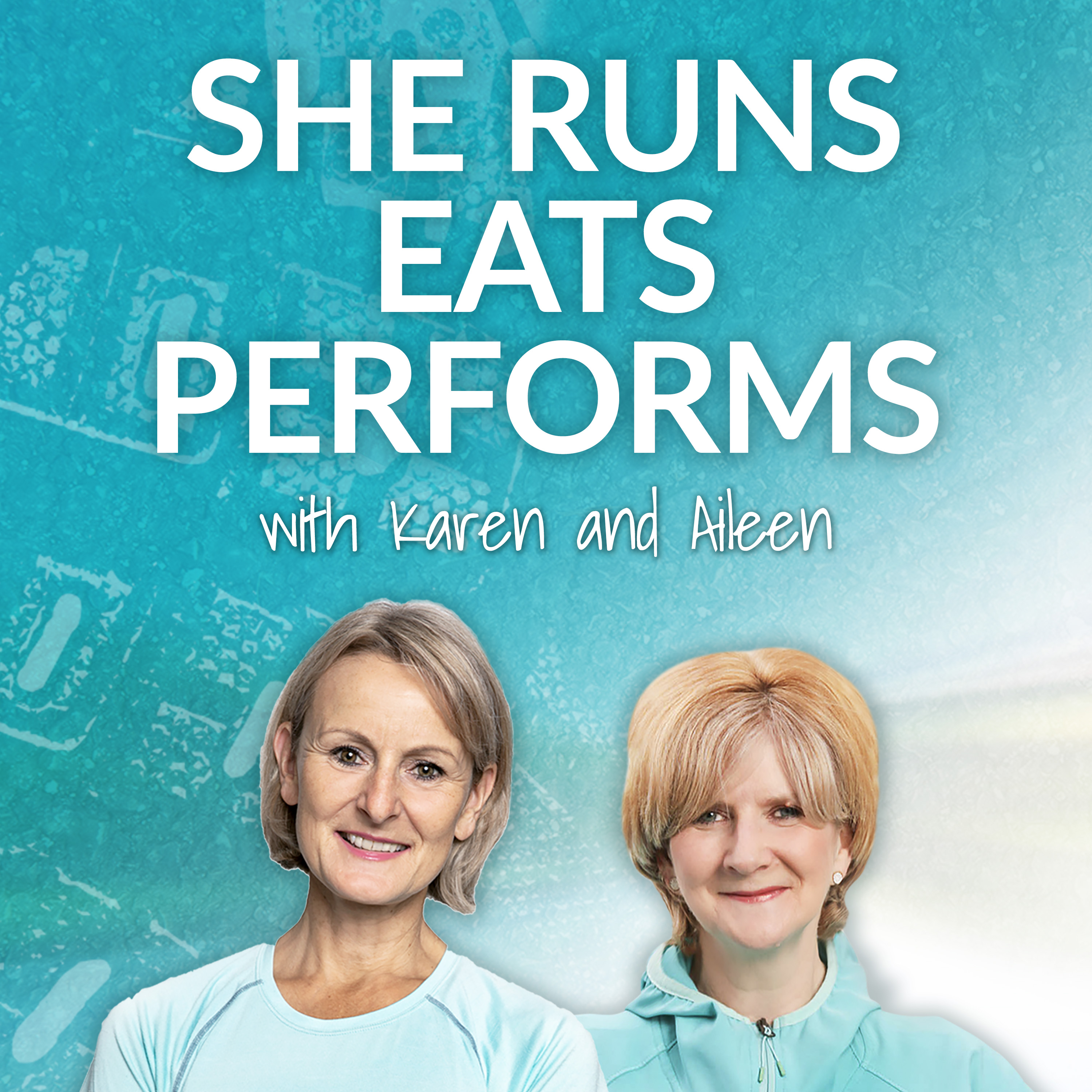FOOD FOR ... Summer Running
Food For ... Summer Running
It’s time to add some summer sunshine into your food plan so today we are talking about some summer foods which are not only delicious but will also support your running performance during the summer time.
We are looking at 4 different summertime foods and outline the nutritional properties of each and then consider how they could be added as part of your meal plan with some menu ideas.
Finally, we’ll share a 1-day menu plan using these 4 foods:
1. New Potatoes
2. Tomatoes
3. Watermelon
4. Radishes
SHOW NOTES
(02:41)
New Potatoes – key nutritional properties
New Potatoes are delicious and tasty, and because they are small they are quick and easy to cook.
The key macronutrient in potatoes is Carbohydrate, we know if we don’t have optimal carbohydrate in our food plans that may be a limiting factor in our running performance.
In an average portion of 125g or just over 5oz there is 25g CHO – that is approximately 4 baby potatoes – that would be a portion for everyday nutrition so for an endurance runner following an athletes portion plate they would likely have double or treble that portion for one meal time.
There is no FAT, and approx. 3g of protein in the 125g portion size, and there is a small amount of fibre – 2g. When potatoes are cooked and then left to become cold, they develop “resistant starch” which is helpful for digestive health as resistant starch feeds colonic bacteria so supports your microbiome. So, eating a cold potato or a potato salad is recommended as being good for your gut! Potatoes are a high GI food – so the glucose content will get into your blood stream quickly. Some ultra-runners and ironman athletes eating boiled skinless potatoes as part of their fueling during events.
If you want to lower the GI/GL effect you may do this by combining eating them alongside some protein – ideal for after training or racing.
The way you cook a potato will also affect its GI content – baking is higher than boiling – all to do with the changes in chemical structure when you cook. Cooled potatoes also have a lower GI.
(09:53)
Reviewing the outcome of a 2019 Study - Potato ingestion is as effective as carbohydrate gels to support prolonged cycling performance.
(13:32)
The key micronutrients in potatoes are:
· Vitamin C (at 27g per portion). Vitamin C is important for collagen production and iron absorption
· Vitamin B6 – a small amount at 0.2mg per portion – important for carbohydrate and protein metabolism
· Potassium – there is more potassium in a portion of potatoes than a banana – potatoes 620g and banana around 400g!! Potassium is an important electrolyte. We often lose potassium in sweat so it’s important to replenish – so eating potatoes as part of your post run meal would be supportive
· Another class of nutrients in potatoes are Carotenoids, such as lutein, zeaxanthin, and violaxanthin, are found mostly in yellow and red potatoes, although small amounts are also found in white potatoes
(16:26)
Food ideas for using new potatoes include: plain boiled with fresh mint, lightly roasted with garlic and rosemary, served hot or cold with dressings or dips, sliced into frittatas or egg muffins, patatas brava
(17:19)
Tomatoes – Key Nutritional Properties
One of the nutrients in tomatoes most researched is LYCOPENE, which is an antioxidant and the redder a tomato is the more lycopene it’ll contain. It’s a fat-soluble nutrient so eating your tomatoes alongside some olive oil would be a great way to maximise absorption. Cooked or canned tomatoes contain more lycopene than fresh.
Tomatoes and tomato-based products has been linked to improved skin health and a lower risk of heart disease and cancer – there are lots of research papers to support this.
There a few small studies looking at the benefit to athletes of consuming tomato juice on a regular basis to reduce inflammatory markers.
Tomatoes are also rich in Vitamin C, E, B9 and K. They also contain calcium and potassium and another anti- inflammatory agent Naringenin which we talked about in E 32 Food for Metabolism.
(22:42)
Menu ideas for tomatoes include: roasted with garlic, salad caprese with mozzarella, gazpacho, summer tomato soup, spicy tomato juice, salad side dish, tomato granita
(28:16)
Watermelon: Key Nutritional Properties
As the name suggests watermelon is 95% water but it also contains lots of important nutrients– Vit C, Beta carotene which converts to Vit A, Potassium B5, Copper, Lycopene - actually very similar to the nutrient content of tomatoes!
It also contains CITRULLINE – which is a non-essential amino acid (meaning the body can make it) – we know that usually amino acids are used to make protein but with regards to citrulline it’s a pre curser to L-arginine improves blood flow. It does so by creating nitric oxide (NO), a gas that helps dilate blood vessels. It’s also thought that Citrulline may stimulate muscle protein synthesis important to a runner. We all love the sweet taste of watermelon which is due to the combination of sugars such as glucose, sucrose, and fructose.
The seeds of watermelon are enriched with protein, fat, and moderate levels of iron and zinc.
Watermelon has been used to support cardio-vascular diseases, obesity, diabetes, ulcers, and various types of cancers.
(31:12)
A 2013 study of seven athletes were supplied with 500 mL of natural watermelon juice (1.17 g of l-citrulline), enriched watermelon juice (4.83 g of l-citrulline plus 1.17 g from watermelon), and placebo. Both watermelon juices helped to reduce the recovery heart rate and muscle soreness after 24 h. Their conclusion was that drinking watermelon juice post-run helped to lessen postexercise muscle soreness. Drink the juice straight or add the juice to your favorite smoothie recipe.
In 2019 a systematic review and meta-analysis was conducted to determine the effect of citrulline supplements on the post-exercise rating of perceived exertion (RPE), muscle soreness, and blood lactate levels. The analysis included 13 eligible articles including a total of 206 participants. The most frequent dosage used in the studies was 8 g of citrulline malate.
The results support the effectiveness of citrulline supplements in lowering Rating of Perceived Exertion and muscle soreness. Athletes may benefit from ingesting either L-citrulline alone or C Malate 1 h before exercise to resist fatigue or relieve muscle soreness. Citrulline supplements are especially recommended for power and strength athletes for them to adequately recover and subsequently train at their desired intensity level. Further evidence is needed to confirm the efficacy of citrulline supplementation among endurance athletes.
(34:47)
A large chunk of melon around 2 cups of fruit will provide around 21g of carbohydrate in the form of glucose and fructose. So, a refreshing slice of watermelon as a post run recovery snack will help replenish carbohydrates as well as helping you to rehydrate. If you also wanted to add some protein to support recovery adding some Greek yoghurt would be an easy option.
Menu ideas for Watermelon include: Feta and mint salad, cooler smoothie, granita, chunks of slices and ice lollies.
(39:16)
Radishes – Key Nutritional Properties
Radishes are spicy, peppery little root vegetables, part of the cruciferous family and are low in calories, provide some fibre and are a good source of vitamin C, folate, vitamin B6, potassium, manganese and calcium. They contain antioxidants called anthocyanins which help give radishes their bright range of colours.
As a Cruciferous vegetable they contain glucosinates, which are sulphur containing compounds. Glucosinolates play a role in regulatory functions for inflammation, stress response, detoxification, and antioxidant activities, and they have antimicrobial properties. Although they are tiny, they do play a similar role to other cruciferous and brassica type vegetables like broccoli, cabbage, cauliflower. Unsurprisingly we didn’t find any sports related research looking at radishes, however they are a lovely seasonal summer vegetable which will add value to our nutritional status.
(43:03)
Menu Ideas for Radishes include: In salads or with a dip, sauteed or roasted with garlic and herbs, served with Crème fraiche and Furikake and Potato Fennel and Radish salad.
Recipe Ideas from Bon Apetit
I found a lovely website https://www.bonappetit.com/recipes/slideshow/radish-recipes
https://www.bonappetit.com/recipe/radishes-with-creme-fraiche-and-furikake
https://www.bonappetit.com/recipe/potatoes-with-fennel-and-radish-salad
https://www.bonappetit.com/recipe/sauteed-radishes-with-bacon
(48:05)
Our suggestions for a one-day menu plan.
(50:45)
Key Take Aways from todays episode:
1. The key nutritional properties of NEW POTATOES are a great source of carbohydrate to help fuel performance and recovery. They also contain Vitamin C important for collagen and iron absorption, B6 for carbohydrate and protein metabolism, they also include Potassium and carotenoids.
2. The key nutritional properties of TOMATOES are lycopene, Nariginen as well as several micronutrients this will support anti inflammatory actions and a few small studies have indicated the benefit to athletes of consuming tomato juice on a regular basis to reduce inflammatory markers.
3. The key nutritional property of WATERMELON is citrulline to help promote muscle protein synthesis, due to its high water content watermelon is also a great food to support hydration status.
4. The nutritional properties of RADISHES are related to it being part of the cruciferous family of vegetables, we talked about glucosinolates and how they play a role in managing inflammation, stress response, detoxification, and antioxidant activities – all important for a mid life female runner.
Related Episodes:
Macronutrients to help runners go faster and longer
Disclaimer:
The suggestions we make during this episode are for guidance and
advice only, and are not a substitute for medical advice or treatment.
If you have any concerns regarding your health, please contact
your healthcare professional for advice as soon as possible.
Aileen Smith and Karen Campbell met at as nutrition students (Institute for Optimum Nutrition, London) and became lifelong friends and nutritional buddies! Both have a love of running and a passion for nutrition, delicious food and healthy living.
Together they host RUNNERS HEALTH HUB. A place for like-minded runners who are looking for simple ways to support running performance, energy, endurance, and general great health.
We are excited to be able to share our expertise, experience and short cuts with you. We hope you'll join us again. If you'd like to know more about us and She Runs Eats Performs please check out our TRAILER.
If you're ready to make learn more about how you may introduce easy nutrition into your running and training plan join our Easy Nutrition For Healthy Runners Online Programme for short videos, recipes, downloads and LIVE training and Q&A.
As a THANK YOU to you as one of our valued listeners, we have a special offer for you use COUPON CODE POD to get 33% discount off the full price which brings the price to £199.
If you’d like help from Karen and Aileen to design a personalised sports nutrition plan for your running - please contact them at hello@runnershealthhub.com
Happy Running!
Aileen and Karen

